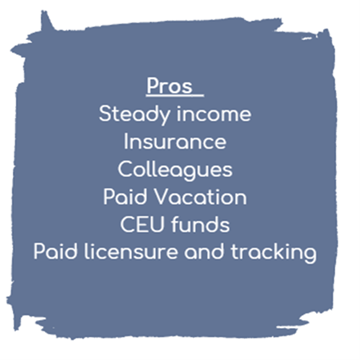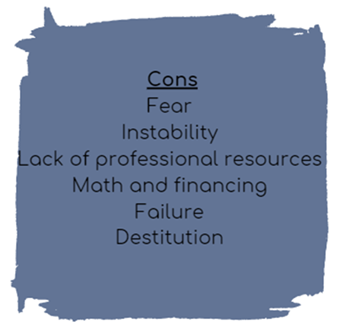The article below reflects the personal opinions of the author(s) and does not reflect the views or opinions of the Perspectives editors or committee, or the National Society of Genetic Counselors (NSGC).
Opening my own business was never something I aspired to do. Having worked in an array of settings, I felt no incentive to leave the comfort of salaried employment. When the thought of doing so entered my mind, it only took a second to draw up a pros and cons list that looked something like this:


Then the labor market for genetic counselors imploded. Heavy hitters, what I had considered solid pillars of my profession — Invitae, Illumnia, Ambry, and my own employer — laid off in droves. Workplaces that were once a hub of comradery and support, where genetic counselors were able to contribute, be appreciated for their skills, and work at the top of their scope became anemic versions of themselves.
Yet, I am a firm believer in the value of genetic counselors. I fell in love with this profession over two decades ago and just like a marriage, various components of it have changed — for good and bad — but I’m in it for the long haul.
For those who are considering taking the leap, know that there is no set formula or recipe (and I know how genetic counselors love their recipe analogies). There are not even NSGC Practice Resources (yet). But there are people in the know, people who have done it before you and who are open to helping fledgling entrepreneurs. Reach out to them. As I often tell my patients, you must advocate for yourself, because you can’t rely on someone else to do it for you. I would not be where I am without my colleagues and mentors. I imagine you won’t get far without yours either.
When talking with them, there will be the inevitable logistical questions most genetic counselors will think to ask:
- What should my business look like? Is it better to be a sole proprietor or to have a partner?
- What are the advantages to being the boss versus a member of a team collaboration?
- How do I define the scope of my practice and the services I offer?
- What do I need to know about malpractice insurance and licensure?
- What EHR platform is the best?
- How will I be paid — via patient, referral source, or insurance?
- Which factors should I consider in choosing a website host and design company?
- How should I market myself?
But I encourage anyone considering this venture to take a step back and ask more poignant questions, because these are the ones that will be most indicative of your success.
- How do you handle unpredictability — do you need to know when, what, and from where your next paycheck will be?
- How do you handle rejection — because every door you knock on, proposal you write, and connection you strive to make will not be answered, accepted, or reciprocated?
- How do you define success — is it through your salary, benefits, lives touched, professional freedom, or job satisfaction?
- Do you have the time and discipline it takes to research and build a business?
- What personal and professional boundaries do you need and will owning your own business permit them?
- Why are you considering this — what is your motivation to start and what will be your motivation to continue?
I’ve been at this for less than a year, and if I were to break down my own learning curves, they’d look something like this:

This graph is going to look different for everyone. Twenty years into this, I was solid on subject matter, but as a member of GenX, raised on hose water and neglect as one meme showed, my social media learning curve was, and let's be honest still is, pretty steep.
My point in sharing this? While there may not be a lot you can do to smooth out that twisty-turvy pink line, I think one of the most important things to know when starting out is that that line exists. There will be ups and downs, big ones, but by considering the questions above, that line will have a better chance of flatten out sooner, just like all the others.
But what if you are not actively considering the leap into private practice? What if you are comfortable in a salaried position? Why might you at least keep the option on the back burner? Well, there is the obvious point that your position may not last. In addition:
- Though the NSGC was incorporated in 1979, genetic counselors continue to struggle for financial recognition from insurance institutions, often having to bill under or in coordination with a physician.
- Genetic counselors also battle for professional authority from state licensure boards, which recognize that they are subject matter experts and allow counselors to discuss the benefits, limitations, and appropriateness of genetic testing yet restrict their ability to order said genetic testing without a physician’s signature.
One way to combat this - increase visibility. The world needs more private practice genetic counselors. Specifically, private practice genetic counselors that are not confined to urban areas, medical institutions, and “traditional” roles who will serve to raise awareness of our profession and who will continue to provide evidence of our worth to the larger healthcare system.
Think of it this way: when was the last time you thought of employing a timing device assembler and adjuster or considered a day in the life of a refractory materials repairer? I’m guessing the answer to both is never, since there are 370 and 580 in total nationwide employment, respectively. But you know what a doctor is and what a lawyer does, because as of 2024 and 2023, there were 1.1 million and 1.3 million, respectively.
Genetic counselors fall in the middle of this range, growing strong at >7,000. Yet there is still work to do to grow awareness through our sheer numbers and exposure. Because who hasn’t been to a party recently and faced the blank stare that follows your answer to, “And what do you do?”
In closing, allow me to provide one final argument for a larger number of private practice genetic counselors: that being the access to and care equity elephant in the room. These remain prominent challenges in our profession. We are a very female and very white profession, yet multiple studies have documented that patients are more comfortable seeing practitioners they can more easily relate to. Increasing the number of genetic counselors in private practice that span sex, race, ethnicity, and culture can better reach those that may be more hesitant to make an appointment, particularly in underserved geographical locations.
So whether you have, are, or just might someday contemplate private practice, consider this my PSA in making that happen.
Shannon Wieloch, MS, LCGC has been a genetic counselor for nearly 23 years, mostly in the reproductive space. She recently opened Stork Genetics, a private practice genetic counseling business aimed at providing easy access to trusted knowledge to empower patients throughout their genetic health journey. She works with patients, providers, businesses, and community leaders in an array of roles, fueled by her passionate to bridge the gap between IVF and genetic counselors and to make genetics commonplace.